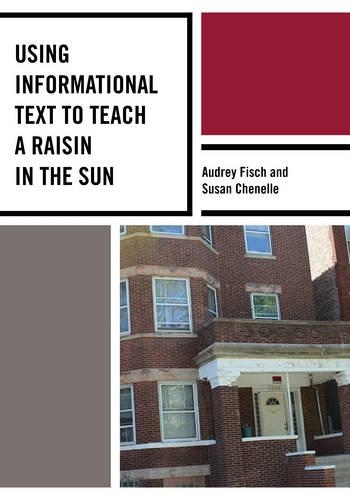
Using Informational Text to Teach A Raisin in the Sun
(Paperback)
Publishing Details
Using Informational Text to Teach A Raisin in the Sun
By (Author) Audrey Fisch
By (author) Susan Chenelle
Bloomsbury Publishing PLC
Rowman & Littlefield Publishers
12th February 2016
United States
Classifications
Professional and Scholarly
Non Fiction
Teaching skills and techniques
Educational: First / native language: Literature studies
373
Physical Properties
Paperback
252
Width 175mm, Height 255mm, Spine 15mm
531g
Description
The Common Core State Standards mean major changes for language arts teachers, particularly the emphasis on informational text. How do we shift attention toward informational texts without taking away from the teaching of literature The key is informational texts deeply connected to the literary texts you are teaching. Preparing informational texts for classroom use, however, requires time and effort. Using Informational Text to Teach Literature is designed to help. In this second volume (the first volume is on To Kill a Mockingbird), we offer informational texts connected to Lorraine Hansberrys A Raisin in the Sun. Readings range in genre (commencement address, historical and cultural analysis, government report, socioeconomic research study, and Supreme Court decision) and topic (housing discrimination past and present, abortion, the racial and cultural politics of hair, socioeconomic mobility and inequality, the violence associated with housing desegregation, and the struggle against the legacy of systemic racism). Each informational text is part of a student-friendly unit, with reading strategies and vocabulary, writing, and discussion activities. Teachers need to incorporate nonfiction in ways that enhance their teaching of literature. The Using Informational Text to Teach Literature series is an invaluable supportive tool.
Reviews
This text takes all the intricacies of the Common Core State Standards and packages themneatly into a format that actually works in a real classroom. With a strong focus on vocabulary building, challenging non-fiction pieces, and digital media to which our secondary students can connect, these units turn A Raisin in the Sun into a cultural, political, analytical learning experience--without taking away the literature. -- Meaghan W. Freeman, middle- and high-school English teacher, Willsboro Central School, New York
A reader's understanding of a text is only as comprehensive as the previous experience he or she brings to it. What, then, happens, when the landscape of a reader's life doesn't provide sufficient context If you feel the impulse to shrug your shoulders and sigh, squelch it. Fisch and Chenelle have created a series of relevant formative activities and assessments to prime the pump for student inquiry. No more flying blind or feeling trapped within the four corners of a text -- students can engage in literature study through a research-informed, "real-world" lens. -- Oona Abrams, ELA Teacher, Chatham High School, New Jersey
Fisch and Chenelle have created another collection of compelling informational texts that offer cross-curricular and Common Core-focused connections to core literature taught in middle and high schools across the United States. The authors have picked important and compelling nonfiction that helps students and teachers gain a deeper understanding into A Raisin in the Sun. Included with the informative nonfiction text pairings are Common Core-aligned lessons to address close reading, vocabulary acquisition, critical thinking, and writing skills. The authors invite teachers to utilize and modify each lesson to make it their own and help bridge the connection between literary and informative texts. This is a must-have resource for any teaching A Raisin in the Sun. -- Michele L. Haiken, Ed.D., English teacher, Rye Middle School; Adjunct Professor, Manhattanville College
Using Informational Text to Teach A Raisin in the Sun does not shy away from the major social issues Hansberry included (and partly omitted) from her play, which were, and still are almost 60 years later, pressing social concerns: African-American womens reproductive rights, hair and identity, racism, violence and housing discrimination. Chenelle and Fisch not only directly address these issues, but they encourage all teachers of Hansberrys play to engage their students with these complex problems facing our society. Their book is a potentially transformative collection reaching across curricular and pedagogical concerns and educational levels with techniques for traditional lecture formats, student-centered learning and MOOC platforms. -- Judy M. Bertonazzi, Ph.D., instructor, Cumberland County College
Author Bio
Audrey Fisch is Professor of English and Coordinator of Secondary English Education at New Jersey City University where she has taught for over twenty years. She has published a wide variety of academic work (including books with Cambridge and Oxford University Presses, numerous scholarly articles, and writing about teaching) and has worked as a curriculum consultant and professional development provider for K-12 districts in New Jersey. Susan Chenelle has taught English and journalism for seven years at University Academy Charter High School in Jersey City, New Jersey, where she serves as English department lead and peer coach for humanities. She holds a masters degree in education from New Jersey City University and a bachelors degree in English from Kenyon College.
